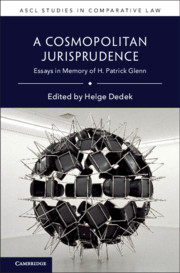Book contents
- A Cosmopolitan Jurisprudence
- ASCL Studies in Comparative Law
- A Cosmopolitan Jurisprudence
- Copyright page
- Epigraph
- Contents
- Foreword
- Acknowledgements
- Notes on Contributors
- Images
- Introduction
- Part I The Tradition of Comparative Law
- Part II The Concept of Tradition
- Part III Crossing Boundaries
- 11 The School of Salamanca: A Common Law?
- 12 The Un-Common Law
- 13 The Fabric of Normative Translation in Law
- 14 Statehood as Process: The Modern State Between Closure and Openness
- 15 Cosmopolitan Attachments
- H Patrick Glenn Publications
- Index
15 - Cosmopolitan Attachments
from Part III - Crossing Boundaries
Published online by Cambridge University Press: 10 December 2021
- A Cosmopolitan Jurisprudence
- ASCL Studies in Comparative Law
- A Cosmopolitan Jurisprudence
- Copyright page
- Epigraph
- Contents
- Foreword
- Acknowledgements
- Notes on Contributors
- Images
- Introduction
- Part I The Tradition of Comparative Law
- Part II The Concept of Tradition
- Part III Crossing Boundaries
- 11 The School of Salamanca: A Common Law?
- 12 The Un-Common Law
- 13 The Fabric of Normative Translation in Law
- 14 Statehood as Process: The Modern State Between Closure and Openness
- 15 Cosmopolitan Attachments
- H Patrick Glenn Publications
- Index
Summary
Patrick Glenn’s final writings on the idea and practice of the ‘cosmopolitan state’ might seem as something of a departure for the world-famous comparativist, but they are in fact strongly continuous with his earlier work, and all the more fascinating for that. For Glenn, comparative law was always a subject in part defined against itself. For it was as much an examination of what connects and integrates different legal doctrinal streams and systems as of what distinguishes and divides them. And so it was quite natural that he should finally come to study systematically the ever more powerful web of transnational and global connections and commonalities that make the contemporary state – in his words – ‘cosmopolitan’ rather than ‘national’. His investigation paints a powerful picture of a global cosmopolitan practice that, against the vision of stronger versions of cosmopolitanism, is not itself globally located; rather it is rooted in different state subsoils, linked together through a matrix of legal, institutional, and cultural factors. Yet the question arises how robust his confident defence of state-centred cosmopolitan attachments would be in the face of the very recent upsurge in a nativist populism for whom ‘cosmopolitanism’ is the pejorative label of choice.
- Type
- Chapter
- Information
- A Cosmopolitan JurisprudenceEssays in Memory of H. Patrick Glenn, pp. 280 - 291Publisher: Cambridge University PressPrint publication year: 2021

